Additional Exemplars Selected for 2014 Yearbook
The 2014 edition of the Conscious Leaders yearbook, to be published mid-Summer, is expected to include around forty additional exemplars, nine of whom are mentioned here in this blog post. The new content will be added to the original edition published in 2013. Here is the latest cohort of exemplars to be included:
Media:
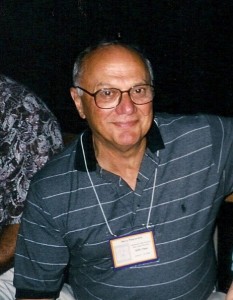 Perry Pascarella was managing editor of the team that created Industry Week (“IW”) magazine in 1970. He became well known for his exploration of new styles of leadership and ways of transforming organizations. He worked with such vanguards as Peter Drucker, Tom Peters, and Frederick Herzberg. From 1986 to 1989 he served as editor-in-chief of IW, leading the magazine to national prominence and record levels of readership. In 1989, he was named vice president for editorial and graphics operations of Penton Publishing Inc., the magazine’s parent company and publisher of 42 business and professional magazines.
Perry Pascarella was managing editor of the team that created Industry Week (“IW”) magazine in 1970. He became well known for his exploration of new styles of leadership and ways of transforming organizations. He worked with such vanguards as Peter Drucker, Tom Peters, and Frederick Herzberg. From 1986 to 1989 he served as editor-in-chief of IW, leading the magazine to national prominence and record levels of readership. In 1989, he was named vice president for editorial and graphics operations of Penton Publishing Inc., the magazine’s parent company and publisher of 42 business and professional magazines.
Pascarella has earned several awards for his editorials and feature articles. In 1992, the American Business Press awarded him the G.D. Crain award for a distinguished career in journalism. He’s authored seven books including The Purpose Driven Organization and Leveraging People & Profit: The Hard Work of Soft Management. For more than two years after entering “early retirement” in 1996, he wrote a monthly column for the American Management Association’s Management Review in which he interviewed and profiled thinkers who challenged the code. That same year I had the honor of being interviewed by Pascarella for an IW article entitled “Design a Better Future.”
Education (Two exemplars):
Peter Senge is the founder of the Society for Organizational Learning (“SOL”), a global community of corporations, researchers, and consultants dedicated to the “interdependent development of people and their institutions.” Based at MIT’s Sloan School of Management, Senge was named by The Journal of Business Strategy as one of the 24 people who has had the greatest influence on business strategy over the last 100 years. In 2000 The Financial Times named him one of the world’s top management gurus and, in 2001, BusinessWeek rated Senge one of the top 10 management gurus. He is the author of the widely acclaimed book, The Fifth Discipline: The Art and Practice of The Learning Organization, which has sold over one million copies since it was published in 1990. This book introduced the corporate world to systems thinking and championed a new model for companies – “the learning organization.”
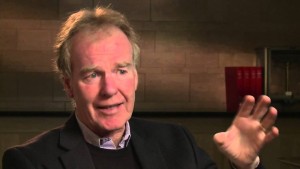 One of my favorite Senge-isms is this: “Leadership exists when people are no longer victims of circumstances but participate in creating new circumstances. Leadership is about creating a domain in which human beings continually deepen their understanding of reality and become more capable of participating in the unfolding of the world. Ultimately, leadership is about creating new realities.” Senge has a meditation practice and, according to Wikipedia, “recommends meditation or similar forms of contemplative practice.”
One of my favorite Senge-isms is this: “Leadership exists when people are no longer victims of circumstances but participate in creating new circumstances. Leadership is about creating a domain in which human beings continually deepen their understanding of reality and become more capable of participating in the unfolding of the world. Ultimately, leadership is about creating new realities.” Senge has a meditation practice and, according to Wikipedia, “recommends meditation or similar forms of contemplative practice.”
 Judi Neal is the founder of the Spirit at Work newsletter, which led to the formation of the Association for Spirit at Work, a membership organization, She taught management classes at the University of New Haven for 17 years, consulted to large companies and is now the retired director of the Tyson Center for Faith and Spirituality in the Workplace at the Sam M. Walton College of Business at the University of Arkansas. She is an officer at the Academy of Management and co-founder of the Journal of Management, Spirituality and Religion. She is the author of Edgewalkers: People and Organizations that Take Risks, Build Bridges and Break New Ground and remains Chairman of Edgewalkers International, a global network of thought leaders inspired by her book. She also serves as Academic Director of the Master of Arts in Organizational Leadership (MAOL) program at The Graduate Institute.
Judi Neal is the founder of the Spirit at Work newsletter, which led to the formation of the Association for Spirit at Work, a membership organization, She taught management classes at the University of New Haven for 17 years, consulted to large companies and is now the retired director of the Tyson Center for Faith and Spirituality in the Workplace at the Sam M. Walton College of Business at the University of Arkansas. She is an officer at the Academy of Management and co-founder of the Journal of Management, Spirituality and Religion. She is the author of Edgewalkers: People and Organizations that Take Risks, Build Bridges and Break New Ground and remains Chairman of Edgewalkers International, a global network of thought leaders inspired by her book. She also serves as Academic Director of the Master of Arts in Organizational Leadership (MAOL) program at The Graduate Institute.
In 2002, Neal and I co-founded the annual International Spirit at Work Award which was presented to companies which employed spiritual principles in their cultures. Recipients include The Times of India, Eileen Fisher Inc., The Body Shop, Conner Partners, Search for Common Ground and several dozen others.
Civil Society (Three exemplars):
Craig and Patricia Neal founded Heartland Inc., which was mentioned amongst the 2013 cohort of conscious leaders, but they were not profiled. Heartland convenes leaders, organizations and communities to increase authentic engagement and create positive, lasting results. Heartland programs are dedicated to creating authentic and essential conversations among individuals and within organizations through training and convening events that serve to bring about the desired systemic personal, social and organizational transformations needed in these extraordinary times. They started Heartland in 1996 after Craig left his job as publisher of the Utne Reader.
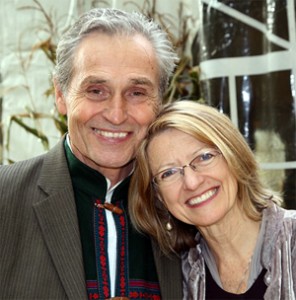 Together they train and certify people in convening “conversations that matter” – virtually and in person – and host and organize Transformational Leadership Circles. The Neal’s (right) are based in the Twin Cities area in Minnesota. They coauthored (with Cindy Wold) a book called The Art of Convening: Authentic Engagement in Meetings, Gatherings, and Conversations. They are longtime members of the Social Venture Network, founded in 1987 to “build a new paradigm: one in which business operates to add value to society — without compromising the well-being of future generations.”
Together they train and certify people in convening “conversations that matter” – virtually and in person – and host and organize Transformational Leadership Circles. The Neal’s (right) are based in the Twin Cities area in Minnesota. They coauthored (with Cindy Wold) a book called The Art of Convening: Authentic Engagement in Meetings, Gatherings, and Conversations. They are longtime members of the Social Venture Network, founded in 1987 to “build a new paradigm: one in which business operates to add value to society — without compromising the well-being of future generations.”
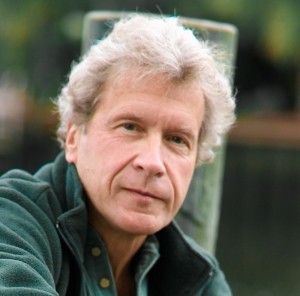 John Perkins possesses an eclectic background that includes two lives. In his first life he was chief economist at an international consulting firm, working directly with heads of state and CEOs of major companies. Those days were full of intrigue, economic entanglements and international corruption. In the 1980s, Perkins left that life behind and embarked upon his second life in which he became an award-winning author of best-selling books and founder NGOs and foundations intended to improve the state of the world. He began working with indigenous people in the Amazonian rainforest, founding or co-founding two foundations and authoring several books including Shapeshifting: Shamanic Techniques for Global and Personal Transformation and his New York Times bestseller Confessions of an Economic Hit Man which revealed much about his first life.
John Perkins possesses an eclectic background that includes two lives. In his first life he was chief economist at an international consulting firm, working directly with heads of state and CEOs of major companies. Those days were full of intrigue, economic entanglements and international corruption. In the 1980s, Perkins left that life behind and embarked upon his second life in which he became an award-winning author of best-selling books and founder NGOs and foundations intended to improve the state of the world. He began working with indigenous people in the Amazonian rainforest, founding or co-founding two foundations and authoring several books including Shapeshifting: Shamanic Techniques for Global and Personal Transformation and his New York Times bestseller Confessions of an Economic Hit Man which revealed much about his first life.
In his second life, Perkins challenges people to soar to new heights, away from predatory capitalism and into an era more transformative than the Agricultural and Industrial Revolutions. His writings detail specific steps each of us can take to create a sustainable, just, and peaceful world. He is devoted to establishing a world our children will want to inherit. Perkins founded Dream Change and co-founded The Pachamama Alliance with Bill and Lynne Twist, who were profiled in last the 2013 yearbook of Conscious Leaders. He is also associated with my company – FutureShapers, LLC – as one of our team of consciousness coaches.
Business (Three exemplars):
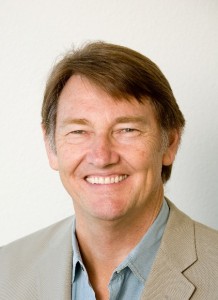 Jay Harman first came to my attention when I heard about a new impeller pump he invented which is able to circulate 10 million gallons of liquid with the same energy footprint as three 100-watt light bulbs. Not only was energy usage cut by a huge percentage but the cost of the pump was considerable less – a win-win! As I held this little odd-shaped pump in my hand I marveled at how it took this long for someone to see that Nature is pretty good at efficient design – so why not mimic that really efficient design?
Jay Harman first came to my attention when I heard about a new impeller pump he invented which is able to circulate 10 million gallons of liquid with the same energy footprint as three 100-watt light bulbs. Not only was energy usage cut by a huge percentage but the cost of the pump was considerable less – a win-win! As I held this little odd-shaped pump in my hand I marveled at how it took this long for someone to see that Nature is pretty good at efficient design – so why not mimic that really efficient design?
Harman has developed a number of successful companies. As founder and CEO of ERG Australia Ltd, he took the company to a highly successful IPO. Now living in the U.S., he is founder and chairman of PAX Scientific, which designs more efficient industrial equipment such as fans, air conditioners, and mixers based on Harman’s revolutionary concepts. The culmination of his work is the development of “Nature’s Streamlining Principle,” a guideline for translating nature’s extraordinary efficiencies into industrial applications.
Jeff Cherry started New York City based Conscious Ventures Lab as an early stage business accelerator with the goal of developing companies and leaders who embrace capitalism as a powerful catalyst for good in society. He and his partners asked, “What would happen if businesses around the world started caring as much about people as they do about profit?”
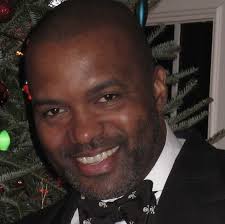 As a CEO, hedge fund manager, designer, entrepreneur, educator, mentor and consultant, Cherry has a diverse and unique career spanning more than 25 years of executive leadership. Influential in the areas of stakeholder management and the emerging discipline of conscious capitalism, Cherry had the honor of consulting with authors David Wolfe and Raj Sisodia on their book Firms of Endearment, How World Class Companies Profit from Passion and Purpose. He later expanded on the ideas of conscious capitalism to form Concinnity Advisors, a hedge fund focused on identifying and investing in companies operating from a more holistic, long-term value mindset.
As a CEO, hedge fund manager, designer, entrepreneur, educator, mentor and consultant, Cherry has a diverse and unique career spanning more than 25 years of executive leadership. Influential in the areas of stakeholder management and the emerging discipline of conscious capitalism, Cherry had the honor of consulting with authors David Wolfe and Raj Sisodia on their book Firms of Endearment, How World Class Companies Profit from Passion and Purpose. He later expanded on the ideas of conscious capitalism to form Concinnity Advisors, a hedge fund focused on identifying and investing in companies operating from a more holistic, long-term value mindset.
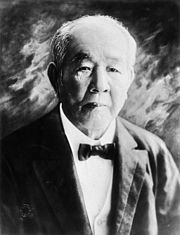 Eiichi Shibusawa (1840-1931) was a Japanese industrialist widely known today as the “father of Japanese capitalism.” He spearheaded the introduction of Western capitalism to Japan after the Meiji Restoration founding the country’s first modern bank based on joint stock ownership. The bank was aptly named The First National Bank. Through this bank, he founded hundreds of other joint stock corporations in Japan, many of whom still survive to this day. He also founded the Tokyo Stock Exchange, the Japanese Chamber of Commerce and Industry and was involved in the founding of many hospitals, schools, universities (including the first women’s university), the Imperial Hotel in Tokyo, along with various charitable organizations, including the Japan Red Cross.
Eiichi Shibusawa (1840-1931) was a Japanese industrialist widely known today as the “father of Japanese capitalism.” He spearheaded the introduction of Western capitalism to Japan after the Meiji Restoration founding the country’s first modern bank based on joint stock ownership. The bank was aptly named The First National Bank. Through this bank, he founded hundreds of other joint stock corporations in Japan, many of whom still survive to this day. He also founded the Tokyo Stock Exchange, the Japanese Chamber of Commerce and Industry and was involved in the founding of many hospitals, schools, universities (including the first women’s university), the Imperial Hotel in Tokyo, along with various charitable organizations, including the Japan Red Cross.
Another notable aspect of Shibusawa’s career is that, despite being the founder of hundreds of corporations, he refused to maintain a controlling stake in these corporations, effectively preventing himself from forming a zaibatsu. What is known as the Shibusawa Zaibatsu was a holding company established to look after his estate for his family. The Shibusawa Zaibatsu did not hold controlling stakes in any companies. Despite his origin as a farmer, Shibusawa was granted the title of “Viscount,” while all other zaibatsu founders were awarded the title of “Baron.” He was also awarded Shōnii, (or Second Honour) which is usually given to high ranking nobility and prime ministers.
The Conscious Leadership yearbook will be published by FutureShapers, LLC, and will be available for downloading from the FutureShapers website later this year.
